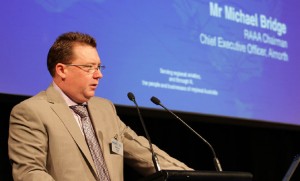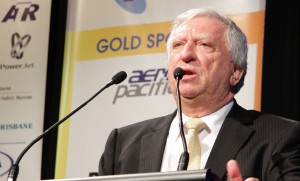
Outgoing chairman of the Regional Aviation Association of Australia (RAAA), Michael Bridge, has fired a broadside at government bureaucrats and politicians about the stifling effects of over-regulation on regional aviation
Bridge told attendees at the annual RAAA convention this morning that commercial aviation was one of Australia’s most over regulated and constrained industries.
“Frank and fearless advice is the publicly stated goal of our senior bureaucrats when advising our elected representatives. And yet, so politicised have these senior positions become that they now appear to be the direct instruments of government policy rather than the expert advisors they should be,” he said.
“This is not commentary on the quality of the individuals, but that the federal government executive has become so politically subordinate to their parliamentary masters it is very difficult for the government aviation agencies to add value to industry. I suspect this trend may not be confined to just the aviation organisations.
Bridge added: “We must never forget that the entire Airservices budget, including a dividend paid to government and over 70 per cent of CASA’s funding comes directly from industry. This gives us all a large stake in what is happening in aviation safety, regulation, air traffic management and fire-fighting services. When the bureaucrats are forced to cower in front of the star chambers euphemistically called Senate Estimates Committees, it will be up to the RAAA and others to hold our ground and state the truth.”
An exasperated Michael Bridge also commented on what the RAAA and broader industry claim is “an attack” on aviation safety culture.
“Our industry’s just culture principles that support the reporting of safety related incidents are under attack. We have a system that has been developed over many years, works well but may be changed to such an extent that confidential reports to the ATSB could be accessed in detail by the regulator. In my view such changes may kill mandatory reporting stone dead and weaken seriously the flow of data that often leads to substantial aviation safety improvements. Both the ATSB and CASA have argued that this is not the intent but sections within the draft Part 119 seem to indicate otherwise.”
Regarding the new draft CAO48 affecting flight and duty time regulations, he added: “There doesn’t seem to be any evidence that the current system is failing. The RAAA will continue to work closely with CASA to ensure that change is not being driven by fatigue theories untested in the aviation environment.”
While mentioning the “rocky” introduction of Airservices’s new Metron flow management system, it was aviation security policy that came under fire from the Chairman.

“I have ongoing concerns regarding Australia’s aviation security policies. If threat levels continue to rise, surely this is a national issue and not one that should be continually charged to industry. If threat levels diminish what are the mechanisms for reducing security infrastructure and cost? The latter question has drawn a blank from government. Has aviation security become an industry its own right, bent on growth with little connection to threat levels?
“Why can I walk onto a domestic NZ flight in a Boeing or Airbus aircraft without passing through any security measures but must undergo the most rigorous of security at some of our regional and remote airports in Australia? Are the security threats that different between our near neighbours and ourselves or have we been captured by a new leech living off our industry’s efforts?”
These and other issues are intended to be raised in March 2013 at the second RAAA Parliamentary Regional Summit, following the success of the inaugural summit in March this year. Attended by Federal representatives, the forum is aimed at informing them on the issues affecting the industry and the impacts of policy decisions on industry sustainability.
Chairman for seven years, Michael Bridge steps down as membership of the Association reaches 100, a milestone he says reflects the confidence the regional aviation community has in the RAAA to lobby effectively on issues that affect the viability of its airlines and airport members.
















pez
says:Great speech, right on the money. Pity it’s not going to do any good.
Brenton Rule
says:This is a very good article. As a new country based Commercial Pilot who flies around Victoria, I am also struck by the need for beaurocracy rather than service; even though we pay for it. Don’t get me started on the CASA examination system. One day Albanese and his organisation may actually realise they are here to SERVE not dictate and abdicate. And so ends my rant.